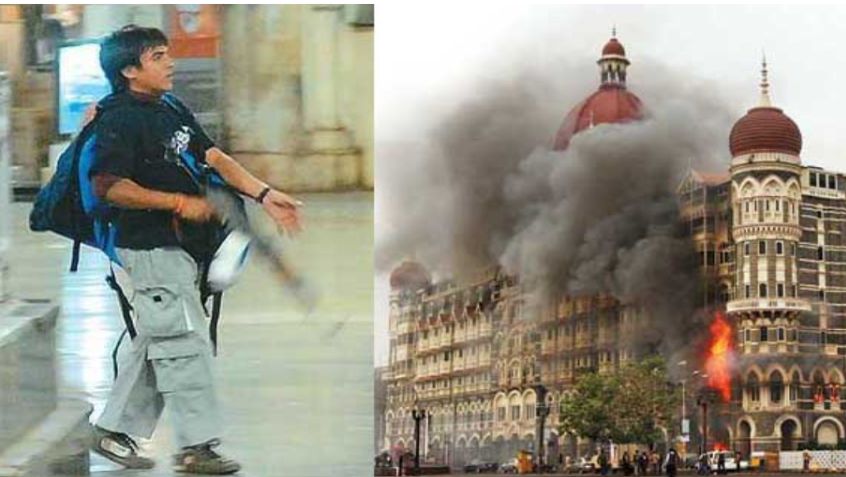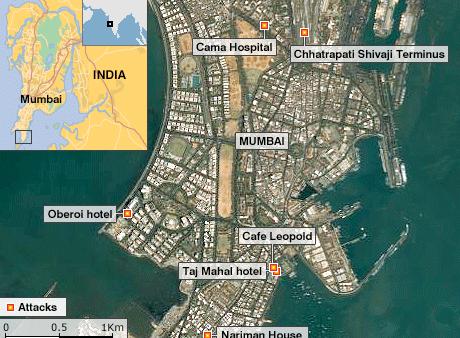By Eric Vandenbroeck and co-workers
The Attacks on Mumbai
The 2008 Mumbai
attacks (also referred to as the 26/11 attacks or 26 November attacks) were a
series of terrorist attacks that took place in November 2008, when ten members
of Lashkar-e-Taiba, a militant Islamist
organization from Pakistan, carried out 12 coordinated shooting and bombing
attacks lasting four days across Mumbai.

Reuters reported that
the terrorists who attacked Mumbai on Nov. 26 came from Karachi/Pakistan.
Indian police say
that the Indian Mujahideen an offshoot of the banned Students' Islamic Movement of India (SIMI), appears to have been given training and backing from
militant groups in neighboring Pakistan and Bangladesh in this case.
In our (2008
World-Journal) opinion the operation bears the hallmark of Al Qaeda, possible
in cooperation with the Lashkar-e-Taiba (LeT), a group that has several affiliate in S. Asia.
Lashkar runs numerous paramilitary camps in Pakistan that have trained
thousands of foot soldiers, and that it operates an empire of schools and
charities under the front group Jamaat-ud Dawa.
Tthat
there also, might be an al Qaeda involvement is possible, indicated by a reporting today, that days ahead of the Mumbai terror attacks, a
suspected al-Qaeda operative hinted that a spectacular operation against
targets frequented by Westerners was in the final stages of preparation.
Given the style of
the operation it is possible that al Qaeda in Pakistan
provided the blueprints for this attack. On-the-ground operations like
training, surveillance and the actual attack appear to have been carried out by
the Pakistani militant group Lashkar-e-Taiba in connection with Indian Islamist
groups.
It is not clear the
degree to which the Pakistani government can control the situation. But the
Indians will have no choice but to be assertive, and the United States will
move along the same line. Therefore the events point
to a serious crisis not simply between Pakistan and
India, but within Pakistan as well, with the government caught between foreign
powers and domestic realities.
Pakistan has a vital interest in supporting proxy militants in
its rival’s territory. That said, Pakistan’s plate is quite full at the moment, with a weak and fractured government trying
to fend off a raging jihadist insurgency and a severe economic crisis. The
Pakistanis are unlikely to be itching for a fight with the Indians that could
bring an additional threat to their border when their troops are already
occupied.
India in turn has a
vibrant history of Islamist militancy.
Speaking from inside
the Oberoi hotel where at least half a dozen foreigners are being held hostage
one of the gunmen, identifed as Sahadullah,
told India TV he belonged to an Indian Islamist group seeking an end to the
persecution of Indian Muslims.
"We want all Mujahideens held in India released and only after that we
will release the people," he said. "There are seven of us inside
Hotel Oberoi."
Preliminary
investigations into the attacks, indicated that at least some Pakistani
nationals were involved, the Times of India reported earlier today. Sources
told the Times of India that information gleaned from captured attackers
indicated that the attackers were Pakistanis. Meanwhile, the Colaba police
reportedly have impounded four boats the attackers allegedly used to reach
Mumbai.
All this while
India's Prime Minister Manmohan Singh announced on TV that the
perpetrators were based "outside the country" and India would
not tolerate (in a clear referrence to Pakistan)
"neighbours" who provide a haven to militants targeting it.
Descriptions of the
attackers thus far point to a combination of Indian Muslims, Kashmiris and
Pakistanis, all 20 to 25 years of age. Hints of a Pakistani connection are also
emerging, with the Indian navy now searching a boat that allegedly originated at
the Pakistani port city of Karachi, delivered eight to 10 militants off the
coast of Mumbai and was heading back to Karachi Nov. 27 when an Indian navy
helicopter encircled and detained the boat.
The Indian government
will not be able to downplay its response to an attack of this magnitude,
raising the potential for India to spin up the Pakistani linkages in the attack
to create a crisis along the Indo-Pakistani border. Discussions are already taking
place among senior Congress officials in New Delhi to amass troops along the
border in Kashmir, a situation reminiscent of the Indian response to the 2001
parliamentary bombing in Mumbai that led to a near-nuclear confrontation
between India and Pakistan.
The connection
between Pakistan’s Inter-Services Intelligence (ISI) agency and the Islamist
militant groups operating in India has become a lot murkier since 9/11 while
the current government in Pakistan has become extremely weak and fractured,
making it more difficult for India to immediately blame Islamabad for the
attack. However, with the political need to respond forcefully, the Pakistani
link can still be spun up relatively easily.
Given the
pre-operational surveillance, planning and coordination of this unprecedented
attack, it also appears that the domestic elements involved in the operation
received outside support, most likely from al Qaeda in Pakistan, which already
has close ties to many of the groups operating in India, particularly
Lashkar-e-Taiba. That one of the militant name game attacks targeted the Jewish
Chabad House (an atypical target for the more indigenous Islamist militants
operating in India) indicates more of a transnational jihadist linkage. Groups
such as Lashkar-e-Taiba, Harkat ul Jihad al Islami
and the Student Islamic Movement of India are all Islamist militant groups that
have collaborated with each other under the Kashmir banner and appear to have
now coalesced under the name Indian Mujahideen. The group Deccan Mujahideen, which
claimed the Mumbai attacks, is likely an affiliate of the group. In the bigger
picture, however, the militant name game is unimportant, since it is meant
primarily to confuse India’s security forces. What is important is the link
that can be drawn back to the Pakistani ISI.
The Mumbai attacks
covered a large number of Western-focused targets over
an extended period of time. While the attacks did not
require the skills of a bomb maker, they did require scores of young men who
were dedicated enough to essentially launch a suicide operation. Such an attack
requires a high level of planning, training and coordination that has not been
seen by the more homegrown Islamist militant groups operating in India over the
past several years.
It is quite possible
that these Islamist militant groups received substantial support from
intelligence elements in Pakistan in carrying out the attack. Since 9/11, the
Pakistani government and military’s command and control over the ISI has become
more nebulous, as many of the handlers who worked directly with the militant
groups have struggled to maintain a balance between obeying orders from above
to crack down on their militant proxies and assisting in operations against
India and the United States. In any case, it is up to the Indian government to
decide how far it will take the Pakistani link in its response to the attacks.
The Indian navy found
a satellite phone in one of those fishing boats searched Thursday night. It may
have been forgotten by a crewman from the mother vessel. Checking its SIM may
provide a vital lead to the terrorist force's departure point and its dispatchers.
Conclusion:
Counter-terror experts estimate that around 500 people must have been involved
in setting up an operation on the scale of the Mumbai assault, working out of
several countries on the Arabian Sea coast.
The gunmen reached
their targets at top speed with unerring precision, indicating -
1. Accomplices were
waiting on the beach to lead them to their destinations. They could easily have
been planted unnoticed by the security authorities among the many thousands of
homeless people who sleep on Mumbai's beaches;
2. Their commanders
carried out surveillance expeditions for weeks or months before the assault and
then briefed the gunmen.
It may take years to uncover all the details of the elaborate Mumbai terrorist
operation. In the meantime, Western intelligence and counter-terror agencies
are badly bothered by the failure of Indian intelligence and all the world-wide
network of terror watchers to pick up a sign that the Mumbai attack was coming.
The very stretch of
water traveled by the terrorists is patrolled by the American aircraft carrier
USS Theodore Roosevelt and its strike group. Neither this vessel nor Indian
naval intelligence noticed anything amiss.

For updates
click homepage here